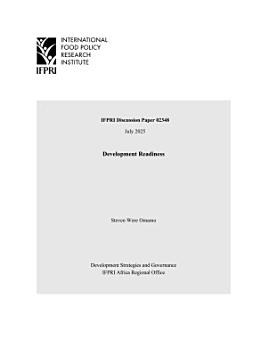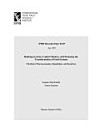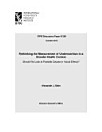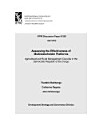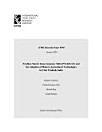Development readiness
Omamo, Steven Were
Hul 2025 · IFPRI Discussion Papers Aklat 2348 · Intl Food Policy Res Inst
E-book
29
Mga Page
family_home
Kwalipikado
info
reportHindi na-verify ang mga rating at review Matuto Pa
Tungkol sa ebook na ito
Why do some systems move while others stall—even when resources, plans, and intent appear similar? This paper introduces the concept of development readiness as one way to understand and address this question. Development readiness is defined as the capacity of a system to act—at the right time, at the right scale, and with purpose—whether in response to crises or in pursuit of development goals. It emerges when kinetic capacity (the ability to move people, goods, and services) aligns with negotiation capacity (the ability to coordinate, decide, and resolve), conditioned by activation costs (tangible and intangible obstacles) and option value (flexibility to act under uncertainty). A conceptual framework based on these four operational forces is set out and illustrated with real-world examples. A structured research agenda and strategy emerges, along with implications for investment and operations. The case illustrations demonstrate that the development readiness framework applies equally at national, sectoral, and organizational levels, with wide-ranging applications—from scaling innovations, accelerating service delivery, and strengthening value chains, to deepening climate resilience and enabling coordinated action in crisis-prone and institutionally fragmented settings.
I-rate ang e-book na ito
Ipalaam sa amin ang iyong opinyon.
Impormasyon sa pagbabasa
Mga smartphone at tablet
I-install ang Google Play Books app para sa Android at iPad/iPhone. Awtomatiko itong nagsi-sync sa account mo at nagbibigay-daan sa iyong magbasa online o offline nasaan ka man.
Mga laptop at computer
Maaari kang makinig sa mga audiobook na binili sa Google Play gamit ang web browser ng iyong computer.
Mga eReader at iba pang mga device
Para magbasa tungkol sa mga e-ink device gaya ng mga Kobo eReader, kakailanganin mong mag-download ng file at ilipat ito sa iyong device. Sundin ang mga detalyadong tagubilin sa Help Center para mailipat ang mga file sa mga sinusuportahang eReader.
